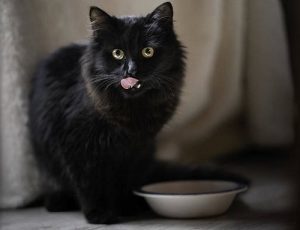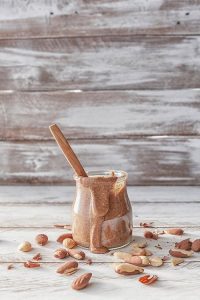Although not a fan of sweets, felines put their paws on every food item they can find. Can Cats Eat Cheesecake? Let us find out!
The first thing that comes to mind at the mention of a cheesecake is the picture of a creamy, delicious delight. If you are thinking, “Can Cats Eat Cheesecake?” you have come to the right place! In this article, we will delve into the topic to help you make an informed decision about whether cheesecake is a safe and healthy treat for your feline friend. So let’s get started!
Can Cats Eat Pancakes? Find out here
What Is Cheesecake?
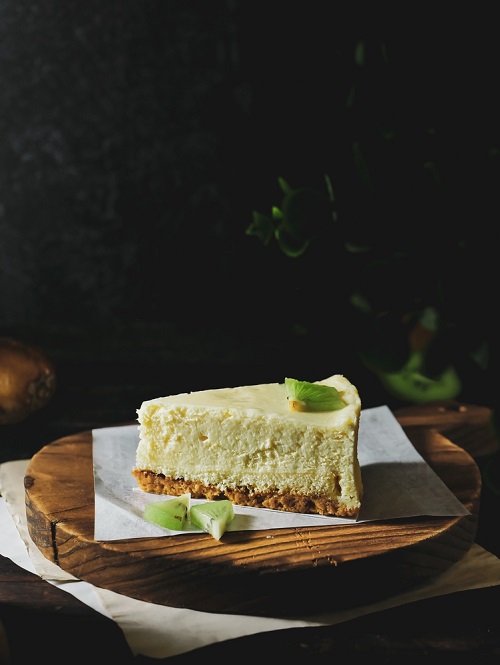
Cheesecake is a rich and creamy layered dessert. The primary layer is a mixture of cream cheese, sugar, and eggs, while the bottom layer is a crust made from crushed cookies or graham crackers. Additional ingredients such as sour cream, heavy cream, or fruit are often added to enhance the flavor and texture. Cheesecake is a popular dessert found in baked and no-bake recipes around the world. Some of the varieties of cheesecake include classic New York-style cheesecake to Japanese-style cheesecake, known for its light and fluffy texture.
Can Cats Eat Cheesecake?
While cats may be curious about human food and may show an interest in cheesecake, feeding them this dessert is not a good idea. There are several reasons why cheesecake is not a safe or healthy treat for felines.
- Cheesecake is not a natural part of the feline diet.
- It’s high in sugar, fat, and calories, which can lead to obesity and other health issues in cats.
- Cheesecake often contains ingredients that are harmful to felines, such as chocolate, nuts, and raisins.
It’s best to stick to treats that are specifically designed for cats and approved by veterinarians to ensure that your feline friend stays healthy and happy.
Does Cheesecake Contain Any Nutritional Value For Cats?
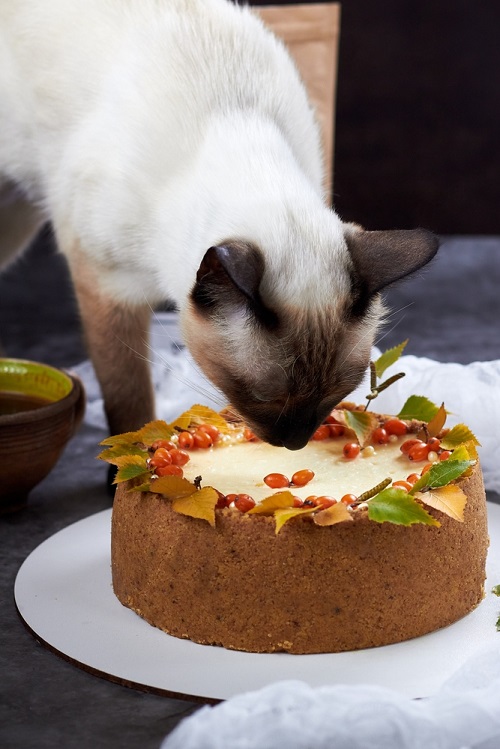
Although cheesecake may contain some beneficial nutrients for cats, such as protein and calcium from the cheese, it’s important to note that these nutrients can be obtained from other, more suitable sources of cat food.
Risks Of Feeding Cheesecake To Cats
- Cheese and cream cheese, which are key ingredients in cheesecake, can be difficult for cats to digest due to their lactose intolerance.
- The high-fat content in cheesecake can lead to obesity and digestive issues in felines.
- The high sugar content in cheesecake can cause dental problems and diabetes in kitties.
- Cheesecake may contain other ingredients that are toxic to cats, such as chocolate and raisins.
- Cheesecake crust may also contain nuts or other ingredients that can be harmful to cats.
- Regularly feeding your cat cheesecake or other desserts can lead to nutrient imbalances and health problems.
- Cats may become accustomed to human food and refuse to eat their regular food, which can lead to nutritional deficiencies.
Options Other Than Cheesecake
After learning, Can Cats Eat Cheesecake? If you’re looking for some best food options for your furry companion, read on:
- Cooked and plain meat without any bones or seasoning, like pork, steak, or fish
- Small amounts of cooked vegetables like sweet potato, kale, or carrots
- Plain, unsalted, and cooked eggs
- Commercial cat treats made with high-quality ingredients
- Homemade cat treats made from cat-safe ingredients like canned tuna, pumpkin puree, and oat flour
Remember, it’s important to keep treats limited to no more than 10% of your cat’s daily calorie intake. Always check with your veterinarian before introducing any new foods or treats to your cat’s diet.
Can Cats Eat Cheesecake? Quick Takeaways!
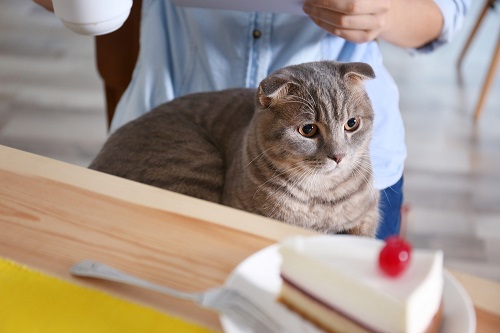
- Cheesecake is a rich and creamy dessert made with cream cheese, sugar, eggs, and a crust of cookies or graham crackers.
- Cheesecake is not considered safe for felines for several reasons.
- Cheese and cream cheese in cheesecake can be difficult for cats to digest, and the high fat and sugar content can lead to obesity, diabetes, and dental problems.
- Cheesecake may contain other toxic ingredients like chocolate, raisins, or artificial sweeteners like xylitol and may cause nutrient imbalances and nutritional deficiencies.
- There are many options other than cheesecake that are safer and healthier for cats, such as cooked meat, plain vegetables, plain cooked eggs, commercial cat treats, and homemade cat treats made from cat-safe ingredients.
- Treats should be limited to no more than 10% of a cat’s daily calorie intake.

